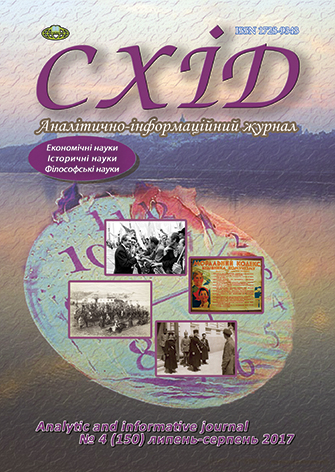State financing of higher education as a factor of development of economics knowledge
DOI:
https://doi.org/10.21847/1728-9343.2017.4(150).111195Keywords:
higher education, Government expenditures, knowledge economy, Budget financing of higher education, Lending to higher education, human capitalAbstract
The article raises issues of the development of the system of higher education in Ukraine as a factor in building a knowledge economy. The approaches to financing higher education institutions and their income structure and the ratio of public and private expenditures on education in Ukraine and countries of the world are considered. The basic forms of attraction of financial resources by institutions of higher education in international practice are determined. The directions of development of the system of higher education in the EU countries are investigated and it is determined that the increase of the state financing is inherent in more developed countries with an innovative model of economic development. It is noted that developed countries pay much attention not only to the development of higher education systems, but also to a much larger share of spending in favor of secondary and vocational education. The article analyzes the existing model of financing education in the country and identifies the problems of financing education in Ukraine. The authors provided recommendations for improving the financial support of higher education institutions in Ukraine.
The solution of the problem of financing the material and technical support of higher educational institutions will be a powerful instrument for development, which will, as a result, promote the quality of higher education as a factor in the development of the knowledge economy. It has been determined that in any model of university financing, funds should be directed, first of all, to updating the material and technical base (modern laboratories, research equipment, etc.) and paying for the work of the scientific and pedagogical staff (primarily, the leading scientists working in these educational institutions). Under such conditions it is possible to build world-class universities in Ukraine.Downloads
References
Heyets, V.M. [ed.] (2005), The economy of knowledge and its perspectives for Ukraine, Scientific report. Institute for Economic Forecasting of the National Academy of Sciences of Ukraine, Kyiv, 168 p. (ukr).
Olejnіkova, L. G. (2015), Formation of a Competitive Taxation System in Ukraine, Academy of Financial Management, Kyiv, pp.16-28 (ukr).
Rak, N.Є. (2009), Economics of knowledge: the essence and factors of knowledge management, Rehіonalna ekonomika, №3, pp. 224-232 (ukr).
D’Aveni, R.A. & Gunther, R. (2007), Hypercompetition. Managing the Dynamics of Strategic Maneuvering. In: Boersch C., Elschen R. (eds), Das Summa Summarum des Management. Gabler,Wiesbaden, pp. 83-93. DOI: 10.1007/978-3-8349-9320-5_8
The Global Competitiveness Report 2016-2017, available at: http://www3.weforum.org/docs/GCR2016-2017/05FullReport/TheGlobalCompetitivenessReport2016-2017_FINAL.pdf.
Salmi, J. (2009), Scenarios for Financial Sustainability of Tertiary Education, in Higher Education to 2030, Volume 2, Globalisation, OECD Publishing, Paris. DOI: 10.1787/9789264075375-12-en
EUA, University autonomy in Europe I - Exploratory study, 2009; ESMU, Funding higher education: a view across Europe, 2010; EUA, Designing strategies for efficient funding of higher education inEurope, 2013.
University autonomy inEurope. Exploratory study. EUA 2009, available at: http://www.salvatorevassallo.org/wp-content/uploads/2008/11/file_Dossier_Universita_EUA_Autonomy_Report_Final.pdf.
Annual Public Report -2013 «Higher education funding and necessary improvement actions». The report, prepared according to Article 219 (2) of the National Education Law 1/2011, was adopted by the National Higher Education Funding Council, at the meeting on 18 July 2014.
Mospan, N.V.(2015), Trends in the development of funding mechanisms for higher education in the European Union, available at: https://www.narodnaosvita.kiev.ua/?page_id=2644.
About Higher Education: Law of Ukraine dated 01.07.2014 № 1556-VII, available at: http://zakon2.rada.gov.ua/laws/show/1556-18/print1450097250371062.
Reform of higher education in Ukraine: the implementation of the profile law in 2014-2016 (2016), Shadow Report, Kyiv, USAID, 23 p. (ukr).
On Approval of the Procedure for Granting Special Purpose Benefit Loans for Higher Education: the Decree of the Cabinet of Ministers of Ukraine of 16.06.2003 No. 916, available at: http://zakon2.rada.gov.ua/laws/show/916-2003-%D0%BF
Smith, Keith (2002), What is the ‘Knowledge Economy’? Knowledge Intensity and Distributed Knowledge Bases, UNU/INTECH, Netherlands, 29 p., available at: http://www.intech.unu.edu /publications/discussion-papers/2002-6.pdf
Powell, Walter W. & Snellman, Kaisa (2004), The Knowledge Economy, Annual Review of Sociology, № 30, 199-220, DOI: 10.1146/annurev.soc.29.010202.100037
OECD glossary of statistical terms. Knowledge-based economy, available at: http://stats.oecd.org/glossary/detail.asp?ID=6864
Heyets, V.M. & Aleksandrova, V. P. & Bazhal, Ju. M. and other (2007), Strategic Challenges of the 21st Century for the Society and Economy of Ukraine. Knowledge economy is a modernization project of Ukraine, Fenіks Publidhing, Kyiv, 544 p. (ukr).
Implementation, Scaling Up and Sustainability: Continuing Discussion on Evidence-Based Policy Research in Education London, 6-7 July 2006, available at: http://www.oecd.org/edu/ceri/37107848.pdf
Downloads
Published
How to Cite
Issue
Section
License
Copyright (c) 2017 Hanna Tereshchenko, Lyudmila Oleinikova

This work is licensed under a Creative Commons Attribution-NonCommercial-NoDerivatives 4.0 International License.
1. Authors bear responsibility for the accuracy of facts, quotations, numbers and names used.
2. Manuscripts are not sent back.
3. The publisher does not always agree with the authors' opinion.
4. The authors reserve the right to authorship of the work and pass the first publication right of this work to the journal under the terms of a Creative Commons Attribution-NonCommercial-NoDerivatives 4.0 International License. This license allows others to distribute (copy) the published work for non-commercial purposes, provided there is mandatory attribution to its authors and a link to the first publication in our journal.
5. The authors have the right to conclude separate supplement agreements that relate to non-exclusive work distribution in the form in which it has been published by the journal (for example, to upload the work to the online storage of the journal or publish it as part of a monograph), provided that the reference to the first publication of the work in this journal is included.

